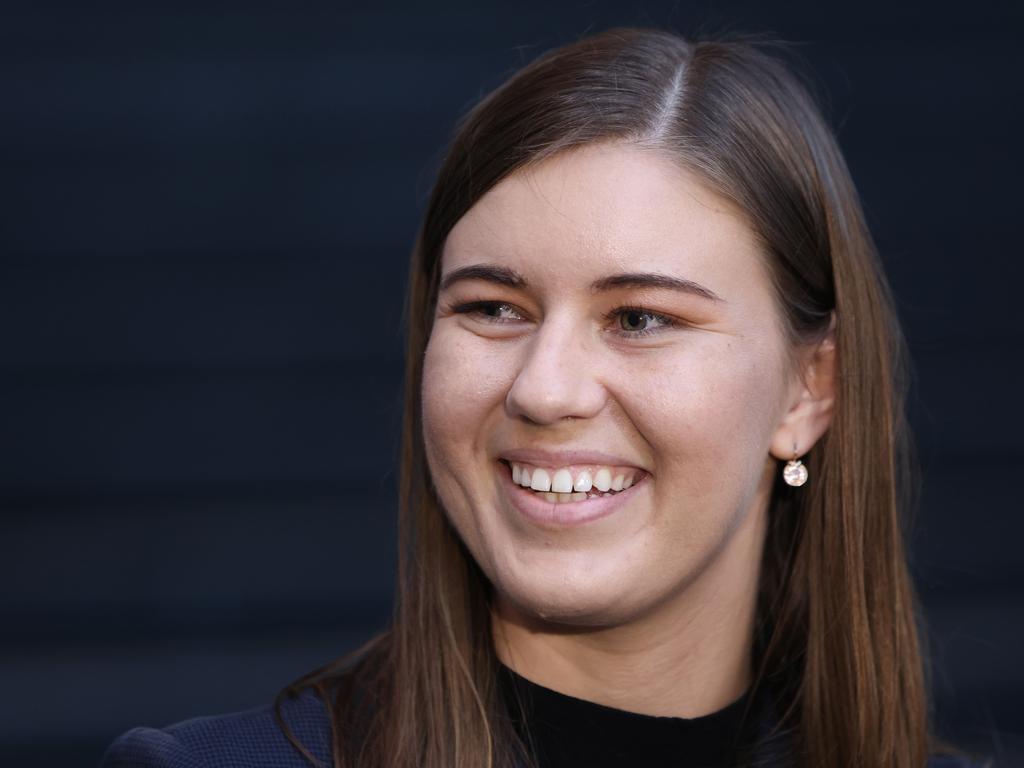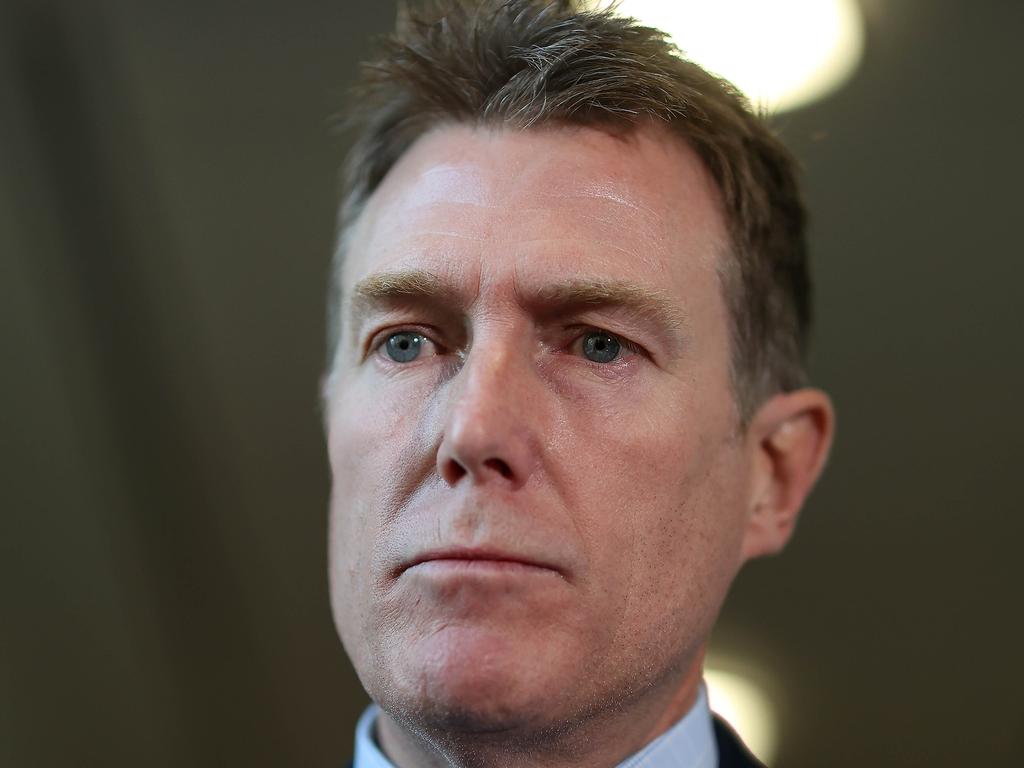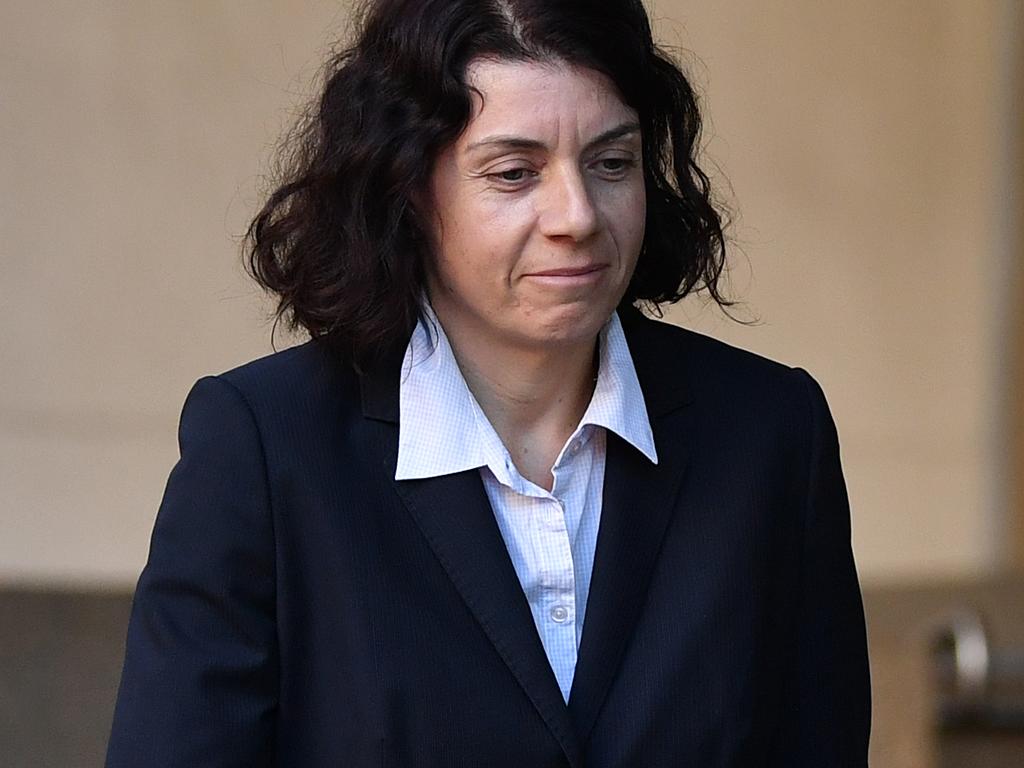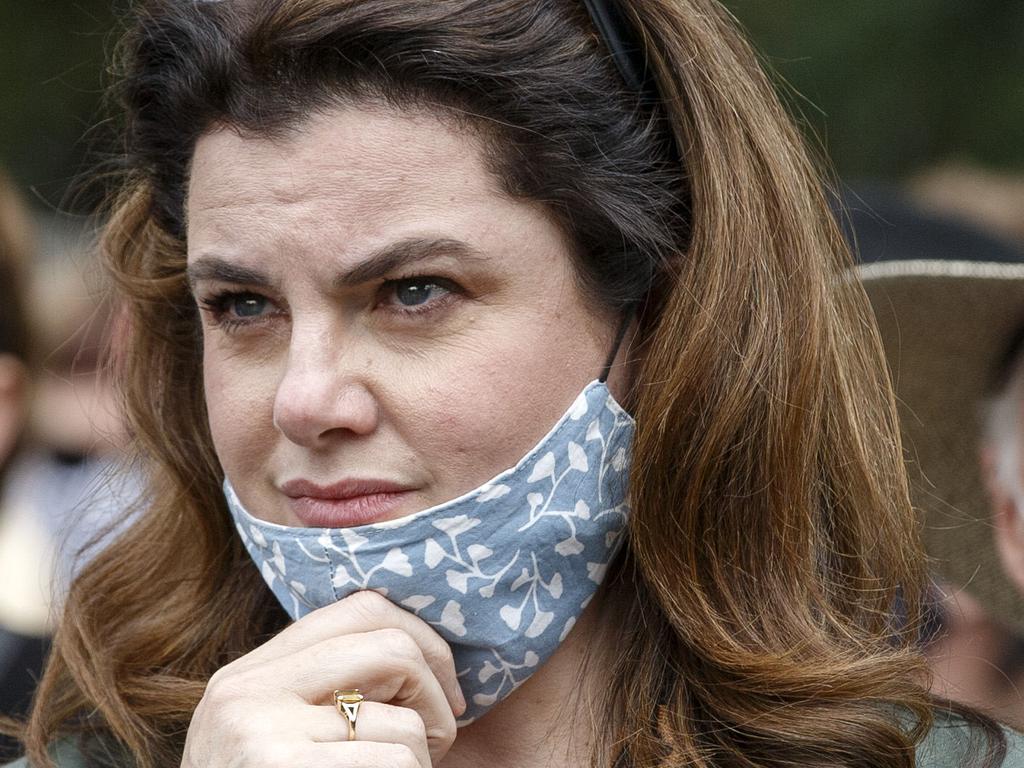Christian Porter loses high-profile barrister Sue Chrysanthou for ABC case
Christian Porter’s barrister Sue Chrysanthou SC has been restrained from acting for him in his ABC defamation case.
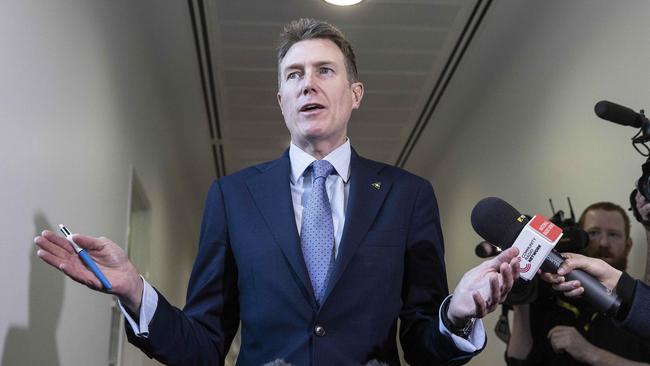
Christian Porter has been stripped of his high-profile barrister as he enters into a mediation with the ABC to try to settle his blockbuster defamation claim against the public broadcaster.
Federal Court judge Tom Thawley ruled on Thursday that barrister Sue Chrysanthou SC should be restrained from acting for the former attorney-general because she had access to confidential information relevant to the defamation case and there was a danger of her misusing it.
The judgment comes as Mr Porter, now Industry Minister, enters into a mediation with the ABC on Friday in an attempt to resolve his Federal Court defamation action over the broadcaster’s reporting of rape allegations against him.
Justice Thawley’s decision comes as a blow to Mr Porter after Ms Chrysanthou spent hundreds of hours on his case.
Jo Dyer, director of the Adelaide Writers Week and a friend of Mr Porter’s alleged rape victim, launched urgent Federal Court action this month to restrain Ms Chrysanthou from acting for him because of information she provided to the barrister while she was advising Ms Dyer on another matter.
Revelations emerged during the proceeding that ABC journalist Louise Milligan had recommended to Ms Dyer that she delete messages from her phone that they had exchanged via encrypted messaging service Signal.

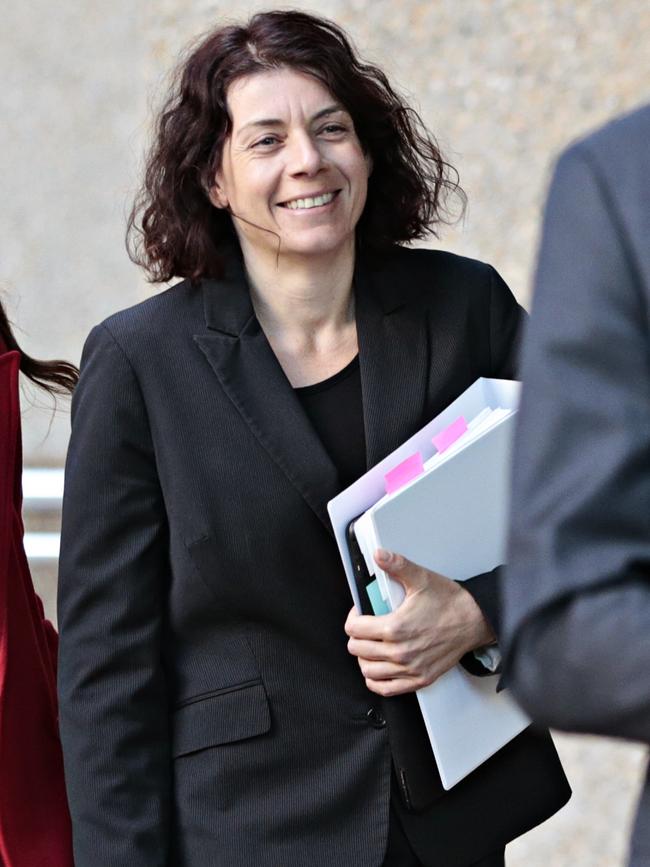
This could be damaging to the ABC’s defence of qualified privilege, which requires it to show that it acted reasonably in all circumstances and without malice.
Justice Thawley said in a summary of his decision that he accepted Ms Chrysanthou was given information at a meeting on November 20, which remained confidential. His detailed reasons were suppressed to preserve the confidentiality of the information.
He said Ms Chrysanthou had given evidence that she did not recall any confidential information and that she no longer had emails received in connection with the meeting.
“However, recollections are liable to being revived and there is nevertheless a risk of subconscious use of confidential information,” he said.
The restraint was needed to prevent the misuse of the information, some of which was relevant to the defamation proceedings, he said. The integrity of the judicial process and the due administration of justice also required Ms Chrysanthou to be restrained. A fair-minded member of the public would say Ms Chrysanthou should not act for Mr Porter, he said.
Justice Thawley accepted there would be prejudice to Mr Porter as a result of his decision, but he said Ms Chrysanthou and Mr Porter must have known from the time he filed his defamation case that an injunction was a “real possibility”. He rejected Mr Porter’s argument that Ms Dyer had unduly delayed her court action by taking eight weeks to file it because there had been attempts by their lawyers during that time to resolve the dispute.
Ms Dyer said outside court the case had “been marked by a profound sadness and loss, and the absence of Kate”. All of the effort, time and money invested in the case stood in contrast to the absence of investigation into Kate’s allegations, she said.
“We continue to believe a defamation case is not the appropriate forum for her story to be tested,” she said, calling on Scott Morrison and Minister for Women Marise Payne to support an investigation by a retired judge.
Mr Porter’s lawyer Rebekah Giles, principal director of Company Giles, said in a statement that Ms Chrysanthou had “been subject to great pressure” but had “provided her services fearlessly”.
“Mr Porter wishes to thank Ms Chrysanthou for her efforts. She is an outstanding and dedicated lawyer, a true leader in her field,” she said.
Mr Porter’s barrister, Christopher Withers SC, told the court this week it would be a “very big deal” for him to lose Ms Chrysanthou’s representation and it could mean the case would be delayed.
He said Ms Chrysanthou had specialist skills as a defamation barrister – but Justice Thawley said Mr Porter would be able to find another silk with comparable skills.
Mr Porter is suing the ABC and Milligan over an online article published on February 26, which reported that an unnamed cabinet minister was facing historical rape allegations.
Mr Porter outed himself as the unnamed minister five days later while vigorously denying the allegations, and launched the defamation action on March 15.
An ABC spokeswoman said mediations were common in defamation matters and it was important for all parties to explore potential resolution options, “especially so for the ABC as a model litigant”.
Ms Giles said the parties were complying with their obligations as Federal Court litigants by attempting mediation.
A key hearing is due to take place before Federal Court judge Jayne Jagot on June 1 and 2 to decide whether a major part of the ABC’s defence should be struck out.
It is unclear who will now represent Mr Porter at that hearing – and unlikely that Ms Chrysanthou would be able to represent him at the mediation.
Justice Jagot has made orders to temporarily suppress one paragraph and three schedules of the defence, but Mr Porter has argued the material should be struck out on the grounds it is scandalous or vexatious and an abuse of process.
Ms Dyer became friends in 1986 with Mr Porter’s alleged rape victim, known as Kate, who alleged that she had been raped by Mr Porter 33 years ago when she was 16 years old and he was 17.
She is not a party to the defamation proceedings between Mr Porter and the ABC.
The November 20 meeting between Ms Dyer and Ms Chrysanthou related to an article published in The Australian, which Ms Dyer believed had defamed her, and the drafting of a concerns notice, complaining about the publication.
The meeting was also attended by James Hooke – a senior managing director at Macquarie Bank, and one of Kate’s ex-boyfriends – media barrister Matthew Richardson, son of Labor powerbroker Graham Richardson, and Ms Dyer’s lawyer Michael Bradley, the managing partner of Marque Lawyers.
On Thursday, the court was told that Ms Dyer and Mr Hooke also had another confidential purpose for seeking Ms Chrysanthou’s advice.
Ms Dyer’s barrister Michael Hodge QC said there was a “factual contest” about what was said during that meeting. He said the evidence of Ms Dyer, Mr Hooke and Mr Bradley was consistent that there was certain confidential information discussed – details of which were suppressed.
Justice Thawley said: “You say that the contemporaneous documents show that that was a purpose which those two (Ms Dyer and Mr Hooke) had in seeking advice and it’s inherently improbable that they did not actually raise the very matter about which they sought advice?”
Mr Hodge replied: “That’s right.”
Mr Porter’s barrister Christopher Withers SC had argued that any confidential information provided at the November 20 meeting was already in the public domain or known to the parties to the defamation action – that is, Mr Porter and the ABC.
Ms Dyer’s concerns notice sent to The Australian newspaper on November 26 referred to Kate’s allegations against Mr Porter, well before they were made public.
The letter, sent by Mr Bradley on Ms Dyer’s behalf, claimed an opinion piece written by columnist Janet Albrechtsen had defamed her.
The Albrechtsen column had criticised an ABC Four Corners program about sexism in parliament, broadcast earlier that month, as “a poorly executed political hatchet job”.
Ms Dyer was quoted in the program criticising Mr Porter for his conduct as a young man and describing him as having “an assuredness that’s perhaps born of privilege”. The program did not air any rape allegations.
The legal letter said Kate had disclosed to Ms Dyer “an extremely serious allegation against Christian Porter regarding events that she alleged had taken place in January 1988” and Ms Dyer had agreed to be interviewed for the Four Corners program because she believed she had a responsibility to her late friend.
The letter said Kate had told many people of the allegations and this “must have come to the attention of The Australian”. It said the criticism of Ms Dyer’s appearance should not have been published because The Australian should have been aware the interview was for the purpose of sharing Kate’s story.
Mr Withers has previously told the Federal Court that Ms Dyer had an interest and a desire to make sure the allegation remained at the forefront of public discussion.
Ms Dyer said on Tuesday that she had believed Kate’s allegation and a “small measure of success” in seeking justice would be if Mr Porter never became prime minister.
The rape allegations were detailed in a dossier sent to the Prime Minister, Labor foreign affairs spokeswoman Penny Wong and Greens senator Sarah Hanson-Young by anonymous friends of Kate.

